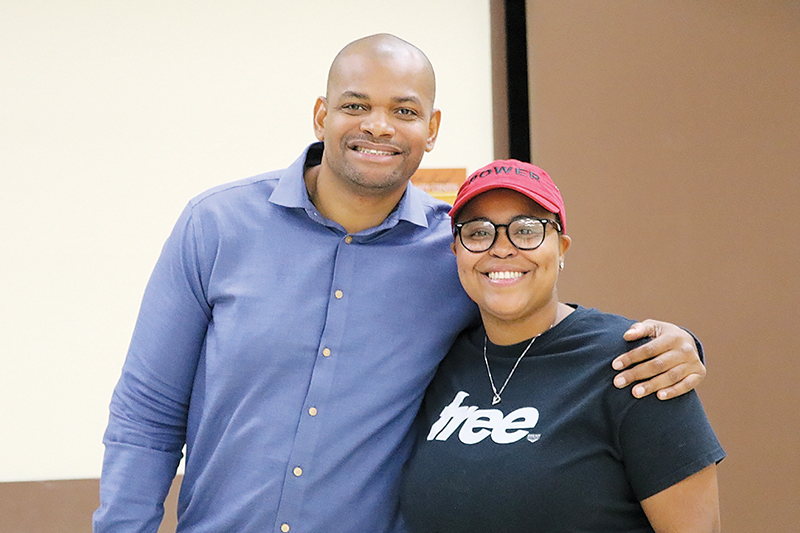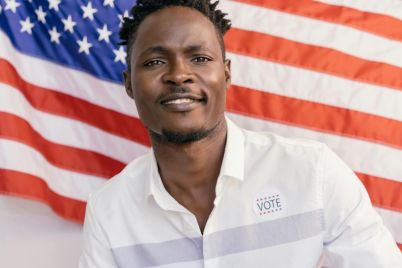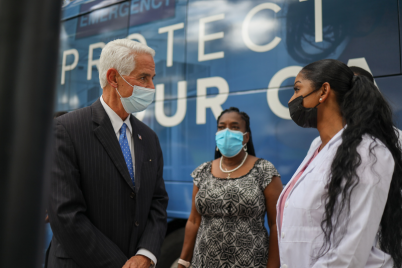Carlton Mayers, II and Epiphany Summers
By J.A. Jones, Staff Writer
CLEARWATER — The statistics are out, and Florida ranks as the worst state for treating kids as young as 10 years old like hardened adult criminals, direct filing more children than any other state.
“Direct file is the law in Florida that allows the state attorney, who is an elected official, to be the only authority to determine if a juvenile anywhere from the age of 14 years old to 17 years old will be transferred from juvenile court to adult court for committing a felony — or sometimes misdemeanors,” stated Carlton Mayers, II, Southern Poverty Law Center’s (SPLC) supervising field director for criminal justice reform in the state of Florida.
“Florida right now is number one in the country for prosecuting juveniles in adult court and ultimately locking them up in adult prisons. It’s a bad number one for Florida to have,” he added.
Mayers was in town with the No Place for A Child coalition, a bipartisan organization out to reverse Florida’s use of direct file by trying to reform the law to substantially reduce the number of kids being direct filed – ultimately with the goal of eliminating the law itself.
The coalition offered a series of Tampa Bay Juvenile Transfer Reform In-Person trainings to give community members talking points and strategies for reaching out to their state representatives.
In October, Mayers led a training at North Greenwood’s MLK Jr Neighborhood Center, joined by David C. Moran, a public defender at the Sixth Judicial Circuit of Florida, Dream Defenders’ statewide organizing director Epiphany Summers, Pastor Doug Walker of Tampa Bay Center for Community Transformation, Zeb Atkinson IV, president of the Clearwater NAACP and others.
The problems surrounding direct file are numerous. For one, it means state prosecutors don’t have to send the children before a judge but can send them directly to adult jail – and there’s no way a child or family can appeal. Florida is one of only 14 states that use direct file, and one of only three that doesn’t give judges the ability to review cases.
Florida sent more than 900 kids through the adult system in 2017-18, sending more kids through the system than states with larger populations like California and Texas. In fact, in 2016, Florida direct filed more children than California, Texas, Pennsylvania, North Carolina, and Michigan combined.
Since 2009, the Sunshine State has prosecuted more than 16,000 children as adults.
Notably, black kids fair worse when it comes to being jailed as adults: 63 percent of youth who are direct filed are black — although black children make up only 22 percent of Florida’s public-school kids.
Additionally:
- Locking children up with adult criminals is antithetical to positive reinforcement and doesn’t provide the common-sense accountability practices provided in juvenile facilities.
- The adult prison system can’t provide the appropriate education or transition services, nor can it assure a child’s safety among adult prisoners.
- Due to safety issues, kids sent to adult jails are often held in solitary confinement — which is regarded as so psychologically damaging it’s considered “tantamount to torture.”
- Children prosecuted as adults receive felony convictions that stay with them for the rest of their lives, depriving them of opportunities in the military or the ability to receive financial aid for college – before they’ve even turned 18.
- Studies show that kids prosecuted as adults leads to higher rates of recidivism and a greater likelihood of returning to crime than those who go through the juvenile justice system.
- Most direct files are for nonviolent offenses; these kids are not a threat to public safety, with 70 percent receiving probation – begging the question why direct file was necessary at all.
With all the research and data, the question is “Why does Florida continue to direct file so many children?”
Most Floridians are against direct file: 86 percent think children shouldn’t be held in adult jail while awaiting trial and 77 percent believe that a judge, not a prosecutor, should decide whether a child is prosecuted as an adult.
While 36 states have passed Juvenile Justice Reform bills to quell the use of direct file since 2005, Florida is not among that number – but the coalition has a plan to change that.
“Right now, we have law that we have gotten a bill on that will be introduced in the house called House Bill 285, which is the Due Process Hearing Bill,” shared Mayers.
Through House Bill 285, juveniles that are direct filed from the state’s attorney from juvenile court to adult court will be able to petition a judge in adult court to review the case, do a mental health assessment of the juvenile, and determine if the state attorney made the proper decision by direct filing that juvenile.
If not, then that judge can send the juvenile back to juvenile court where they will be treated as, and receive a sentence appropriate to, a juvenile.
The training schooled participants on direct file, as well as giving them pointers on how and when to reach out to lawmakers, sample scripts for discussing the issue and gauging their representatives’ responses, and how to encourage legislators to learn more about House Bill 285.
Participants also got to hear several mothers share painful stories of youth who were locked away by direct file.
Summers said that the SPLC has been a long-time partner in Dream Defender’s work to dismantle systems contributing to mass incarceration and the youth impacted by it.
“We think it’s a great opportunity to let people know that direct file is pretty horrible in Pinellas County. People like Bernie McCabe and Sheriff Gualtieri continue to allow these things to happen – and both of their seats are up for re-election next year.”
Dream Defenders is already gearing up for electoral work around these campaigns next year.
“Our position on restorative justice for juveniles is that there are far too many juveniles in the adult prison system,” stated Clearwater NAACP’s Atkinson. “We’re looking for solutions to get them out and to put judgment in a more partial person’s hands than the state’s attorney.”
To reach J.A. Jones, email jjones@theweeklychallenger.com








